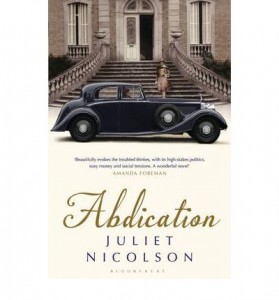lip lit: abdication
Abdication is an imagined experience of the tumultuous thirties. Through the eyes of an overweight spinster Evangeline Nettlefold and young chauffeuse May Thomas, the novel is written from an outsider’s perspective assessing the social climate in England.
May grew up an independent and beautiful daughter of Scottish immigrants living in Barbados. The beginning of the novel sees her leaving her island home in an attempt to escape her drunken father. May secures a job driving Sir Philip and Lady Joan Blunt to high society events and parliamentary meetings, and is privy to gossip about the country’s most important people (which must, of course, be kept secret).
Boston-born Evangeline has dealt with a ‘cantankerous’ mother who constantly criticises and belittles her. Finally free when she dies, Evangeline accepts an invitation to England by her godmother Joan, where she reignites her school-time friendship with Wallis Simpson. Despite being a married woman, Wallis is in a scandalous relationship with new King Edward VIII, and flits through various levels of England’s upper class.
The title of the novel sets the overall theme – as any monarch enthusiasts would know, Edward surrendered the throne to his brother Albert in 1936. Abdication shows that the British public feel betrayed by such a selfish manoeuvre, as the royal family are the parents of the entire population of England.
Continuing with this theme, characters reveal stories of their flawed (or, somewhat unconvincingly, villainous) parents who range from alcoholics, social climbers, mentally incapable or fearful. All children feel a sense of betrayal at the selfish actions of the parents, reflecting the British attitude towards the King.
“It’s hard to believe that a man who cared about this country, our country, I should say, has gone and abandoned us,” says Nat, May’s cousin. The King puts his love for a divorced woman before his duty to England, and Abdication hints at the agony the people of Britain felt.
Juliet Nicolson has captured the British experience from the perspective of the working class, amplifying the public’s interaction with the royal family. Old ladies gossip on the street, symbolising societal expectations: ‘Edward’s going on more than forty if I’m a day. Should be married by now. It’s not natural at his age, if you ask me. A King needs a wife, just as I need a husband.’
Constant reminders of the war’s tragedies coupled with the rising popularity of the black shirts in London means the inevitable horror of the Second World War looms over the narrative like a dark thunder cloud.
Overall, Abdication is a story attempting to personally explore the bewildering social change which occurred in 1936 England. Sir Philip claims that ‘the whole world seems upside down’, while May feels as if the ‘certainties of life [are] unravelling around her.’ High unemployment, an eroding class divide, an uncertain throne, impending war and a flood of anti-Semitism – Europe is in upheaval.
This is Nicolson’s first novel; having written two nonfiction books, it’s obvious that she’s a history aficionado by her obsession with facts and names, and her attempts to shove as many iconic events and people as possible into the narrative. Julian goes to the Berlin Olympic Games. May is acquainted with Virginia Woolf. A lady on a poor London street quietly has an abortion (a simple exposition of a woman’s struggle). All these ideas and details are skimmed over without much depth. This produces the effect of reading like a gossip mag; names are dropped, characters are hurriedly introduced and scandalous details are revealed before disappearing.
Despite issues with believability, this is a pleasant novel to curl up into and escape to a world that contains rumblings of war, the social climate of the thirties, and romances between a chauffeuse and a gentleman, a king and a socialite.
Abdication is published by Bloomsbury.


